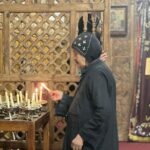By: John Watson Kyrillos was first and foremost a priest who celebrated the Eucharist daily. He was also a monk. ‘Priest-monk’ is not always a useful description of either one who has given himself to the sacerdotal life nor to one who has joined a monastery as a monk. The priesthood has often been little …
By: John Watson
Kyrillos was first and foremost a priest who celebrated the Eucharist daily. He was also a monk. ‘Priest-monk’ is not always a useful description of either one who has given himself to the sacerdotal life nor to one who has joined a monastery as a monk. The priesthood has often been little more than a process in the progress of an ambitious man to a political and ecclessial role in the episcopate. This is often obvious in many episcopal careers in the Anglican and Catholic churches in the West. Monastic life is a necessity for a monk seeking the episcopate in the Eastern churches. The abuse of the system may not be universal, but it is certainly transparent in many cases. A man who has devoted his life to the attainment of Episcopal office may sit lightly to his priestly or monastic obligations. It was not so with Kyrillos: ‘priest-monk’ is the precise term to define the life of Abba Kyrillos over four decades, whether he was in a monastic hermitage or patriarchal palace.
For forty years Kyrillos stood before the altar almost every day and consecrated the Bread and Wine so that it would be for him the true Body and precious Blood of Jesus Christ. It was the central action of his life. It is calculated that he celebrated the Divine Liturgy on at least 12,500 occasions. It is not usual for Orthodox monks to attend the Liturgy every day even though some monasteries do have a daily celebration; some only have a weekly observance. Orthodoxy has tended to emphasize the necessity of the presence of an earthly congregation, brought before the gate of heaven and the heavenly congregation, and the altar has been perceived as the divine throne set amongst the assembled people of God. In the West it would not be uncommon for a patriarch or priest to celebrate the Mass every day. Western sacramental devotion can be, at least in part, much more personal and contemplative than communal. Kyrillos certainly understood the Eucharist not only as infusion with the life of Christ but also as meditation upon the Incarnation, and he seems to have taken a very literal attitude towards the dominical command ‘Do this in remembrance of me’.
Father Raphael of St. Mina’s monastery in the Mariout desert who was once the patriarchal deacon, records the Coptic Pope’s comment when asked about his daily Eucharist: ‘If the priest is accessible, the flour is handy and the altar is available, and then if we do not pray, what shall we say to God?’ Kyrillos would have understood those many Western Christians who have experienced the daily allure of Remembrance and Thanksgiving which are the essentials of this great anaphora. Each day is the first and last day of our pilgrimage on earth. The food of the Eucharist is our bread and drink for today. Kyrillos was deeply convinced of the strength gained from the Eucharistic elements. This daily devotion to Christ in the Eucharist is especially noteworthy, continuing, as it did, throughout the twelve hectic years of his patriarchate.
From Ebook: ABBA KYRILLOS: PATRIARCH AND SOLITARY
Abba Kyrillos: Patriarch and Solitary – eBook









